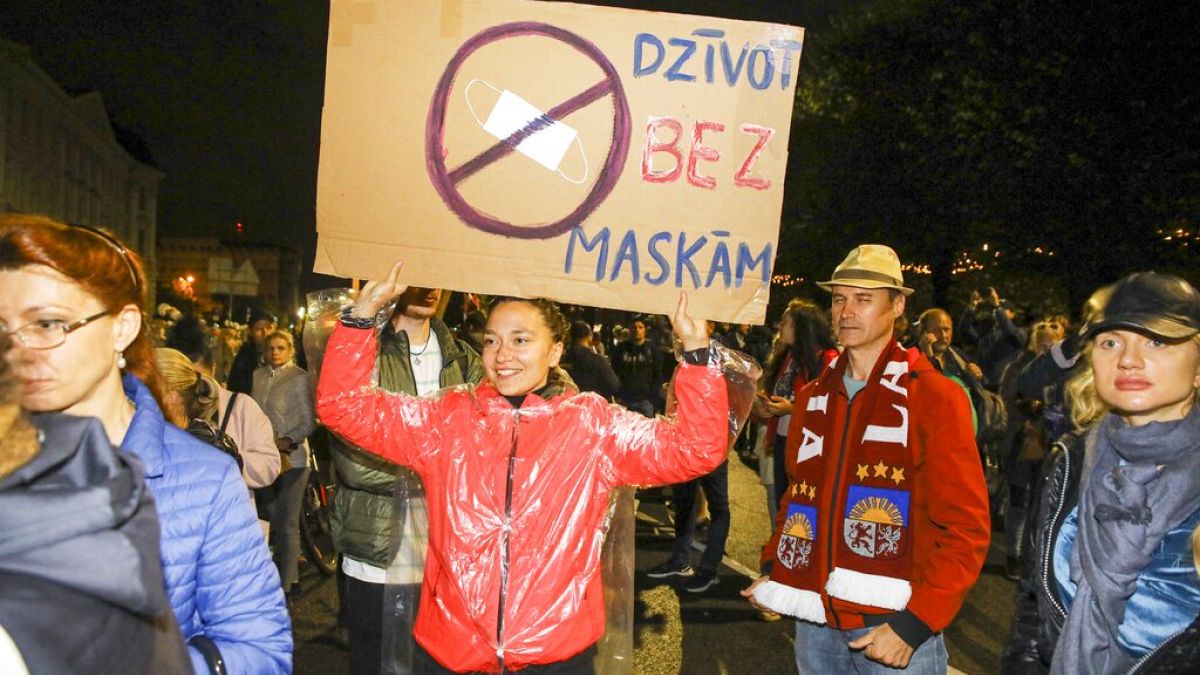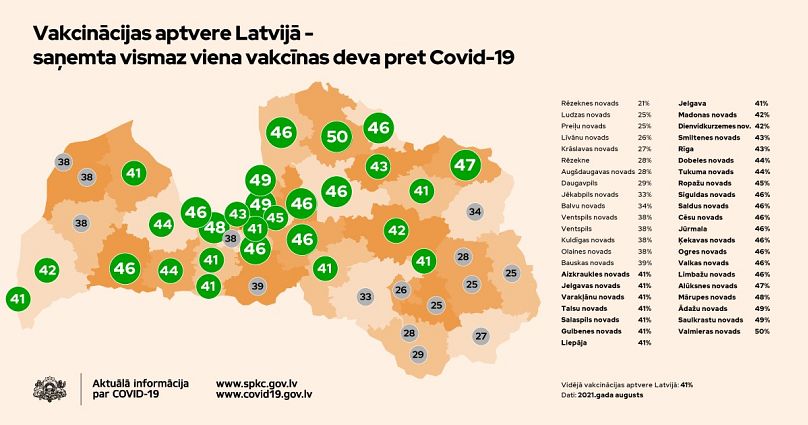More than two-thirds of EU adults have been fully vaccinated against COVID-19. In Latvia, that figure is 45.5%
Two-thirds of EU adults have been vaccinated against COVID-19, but some countries are struggling to get above 50%.
Latvia -- caught between disinformation and mistrust of the government -- is one of them.
Not even half of its 1.9 million population has been fully vaccinated against coronavirus. The number lags at around 45.5%, according to the latest data from the European Centre for Disease Prevention and Control.
The country started off slow in the spring when vaccine deliveries were initially delayed. Many citizens opted to skip AstraZeneca -- the only vaccine available at the beginning -- as other European countries decided to only give that particular jab to older people.
But now it’s facing a problem of a different order: the country has large stocks of vaccines but fewer and fewer people are willing to have them.
Particularly in the eastern portion of the country, where many have only been following Russian state media, vaccination rates are sometimes below 25%.
"Two things are happening at the same time," Aleksandra Palkova, a junior researcher at the Latvian Institute of International Affairs, a Riga-based think tank, told Euronews.
"On the one hand Latvian speakers are more willing to get vaccinated than Russian speakers - they often follow different media.
"Secondly, mistrust in the government has risen because of unclear messaging about restrictions last autumn and winter."
The Latvian National Health Board, SKPC, announced last week that the pace of vaccination hadn't been slower since the end of June.
The SKPC has been getting creative in order to up vaccination rates. For instance by setting up vaccination stations at the many arts and crafts markets across the country during the summer.
In the meantime, the Delta strain of the coronavirus makes up 98% of all infections in Latvia.
Centre-right prime minister Krisjanis Karins is upping the pressure: "I anticipate that there will be different restrictions on people who have not chosen to vaccinate, a number of services may not be available to them", he said.
A law is in preparation to allow employers in certain sectors to fire people who refuse to get vaccinated. Starting from October 1YY, employers will be asked to define which roles require a vaccination and inform the people working in those positions. The government will also make jabs mandatory for teachers and health care workers in both hospitals and nursing homes.
Exempted from these rules are those who have a medical reason which prevents them from being vaccinated, pregnant women and mothers up until two years after childbirth.
Before the Saeima, Latvia’s parliament, votes on the proposal, there will be several rounds of debates.
Disinformation is also increasing on social media. Latvia has long been a target for disinformation from its neighbour to the east, Russia. In the first wave of the pandemic, Sputnik ran a story that claimed the coronavirus had been engineered in a Latvian lab in order to gain political advantage. Russian disinformation has also been feeding fears that Western vaccines are not effective or outright dangerous.
Russian speakers -- in some cases ethnic Russians -- make up about a quarter of Latvia’s population. 210,000 of them are so-called "non-citizens", a special category of resident created in the 1990s for (descendants) of Russian migrants who were enticed to move to Latvia to Russify the country under Soviet occupation. A language and history test provide them with a way to become Latvian citizens.
"Most of the time, politicians in Latvia use language and ethnicity to divide society more. This has not been the case during the pandemic," says Palkova.
"From the very beginning, all governmental information has been available in both languages, and often also in English."
The parallel information spheres in Latvian and Russian are perhaps finally unifying. The national broadcaster LSM has been providing news in Latvian, Russian and English online. A television channel in the Russian language but edited in Latvia has also been created during the pandemic, along with bans instated on Russian state channels.
"I believe the government was waiting for a good moment to launch such a service," says Palkova. "Corona was that moment."



